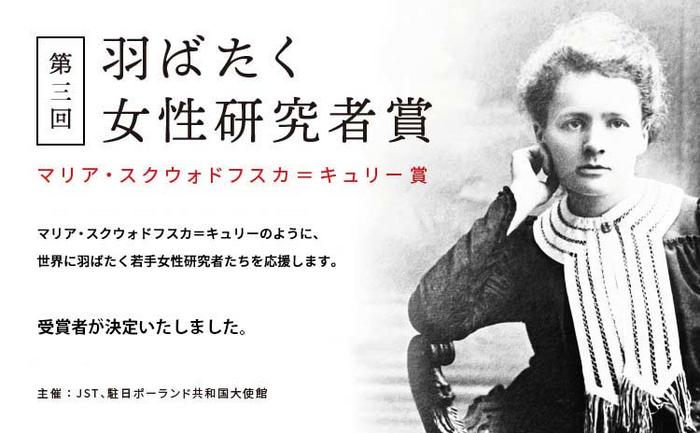JST has selected winners for the third Marie Sklodowska Curie Award for young female researchers. For the third Marie Sklodowska Curie Award, we accepted applications from October 2 to December 11, 2023. Through document screenings and interviews with external experts, we have selected one Grand Prize winner and two Inspiration Prize winners. JEOL Ltd. will award 1M yen for the Grand Prize and 500K yen for each Inspiration Prize.

Credit: JST
JST has selected winners for the third Marie Sklodowska Curie Award for young female researchers. For the third Marie Sklodowska Curie Award, we accepted applications from October 2 to December 11, 2023. Through document screenings and interviews with external experts, we have selected one Grand Prize winner and two Inspiration Prize winners. JEOL Ltd. will award 1M yen for the Grand Prize and 500K yen for each Inspiration Prize.
JST recognizes the importance of initiatives designed to promote the activities of female researchers in science, technology, and innovation, and based on this belief we established the “Marie Sklodowska Curie Award” in 2021, together with the Embassy of the Republic of Poland, for awarding young female researchers who are expected to flourish across the world. The award’s namesake, Dr. Marie Sklodowska Curie, was recognized for her achievements in her early thirties and later won two Nobel Prizes. The award honors her great contribution and achievements to the development of science and technology, and we hope her example will inspire the ambitions of Japanese female researchers.
While the latter half of the doctoral program and the first few years after obtaining doctoral degrees are the most promising period for female researchers to make great strides as independent researchers, it is also true that they often face various life events during this period. By honoring the achievements of the winners and making them widely recognized, we hope that this award will support them to take a leap forward with their passion and flexibility as well as to foster the next generation of female researchers.
The Winners of the Third Marie Sklodowska Curie Award
Grand Prize Winner
Prize pot: 1M yen,
Sub prize: Travel expenses (transportation and accommodation) to visit research institutes in Poland
Kana Moriwaki
Assistant Professor, Research Center for the Early Universe, Graduate School of Science, The University of Tokyo
Dr. Moriwaki was the first in the world to point out the importance of observing oxygen spectral lines rather than the traditional hydrogen spectral lines in order to elucidate the large-scale structure of the early universe. She also proposed a signal separation data analysis method using machine learning, which enables the detection of distant galaxy clusters with extremely high efficiency.
These results are highly original and impactful, contributing significantly to the data analysis of astronomical observations, which has led to launch the large-scale international project. As a role model and science communicator with excellent presentation skills, in a field where there are few female researchers, she is expected to play the active role in Japan and overseas.
Inspiration Prize Winners
(Prize pot: 500K yen each)
Kei Ota
Assistant Professor, Department of Applied Chemistry, Faculty of Science and Engineering, Kindai University
Dr. Ota pioneered new area of elemental chemistry by utilizing boron and nitrogen to synthesize novel inorganic aromatic compounds that do not contain carbon atoms in their frameworks as well as developing compounds with new bonding motif. Her achievements in designing molecules and developing reactions using main-group elements, which are generally more abundant than transition metals, are highly novel and will change conventional thinking on the issue.
After obtaining her PhD in Chemistry from Nanyang Technological University in Singapore, she has continuously been engaged in highly creative research. She is a promising talent who is expected to make great contributions both in Japan and overseas.
Aya Mitani
Assistant Professor, Dalla Lana School of Public Health, University of Toronto
Dr. Mitani has developed new statistical methodologies to model the progression of gum disease and predict the probability of tooth loss based on complex long-term dental examination data, and enabled more accurate prediction of gum disease progression.
Her interdisciplinary approach to solve difficult problems in dental public health using appropriate statistical techniques is innovative and exemplary. She has already established herself as a principal investigator in Canada and is actively engaged in international collaborations.



